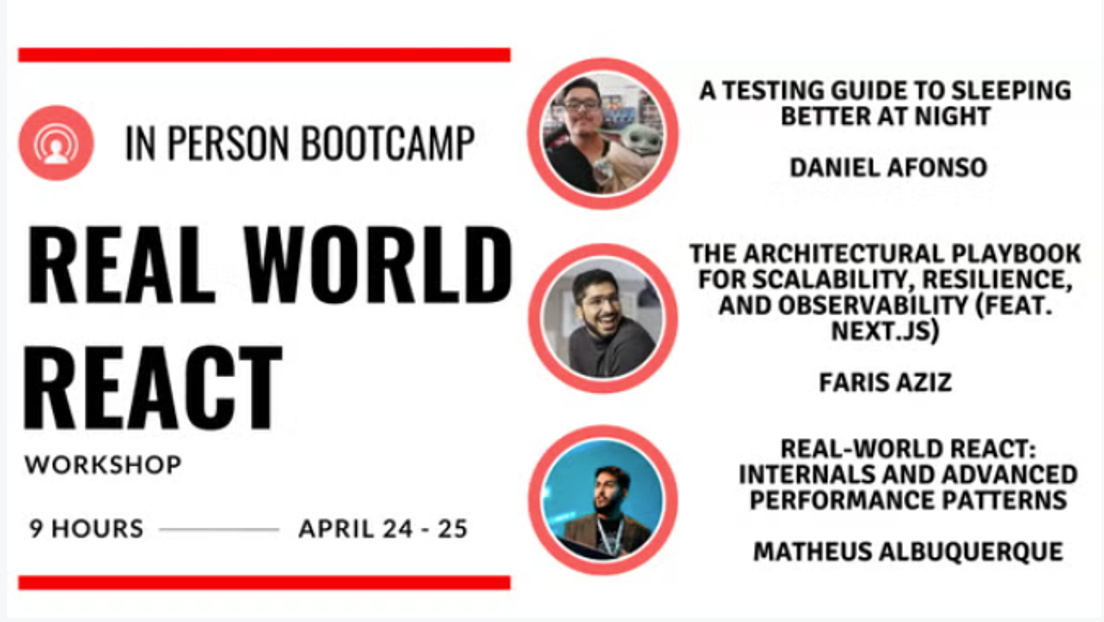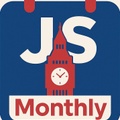
REACT BOOTCAMP - 9HRS

Hosted by
JavaScript Monthly London Meetup
Wednesday, April 23rd-24th
10:00AM to 5:00PM BST
In-Person
Address available to attendees
We missed you this time around!

For tickets please visit the conference's website
This workshop is a 9 hours workshop and it will be part of CityJS London 2025 event.
During the event we will host 9 hours workshop in two days with 3 instructors that will help you get to the heart of Real World React, using React for Real Applications.
Our instructors are:
Daniel Afonso
A Testing Guide to Sleeping Better at Night
Matheus Albuquerque
Internals and Advanced Performance Patterns
Faris Aziz
Real-World React: The Architectural Playbook for Scalability, Resilience, and Observability (feat. [Next.js](http://next.js/))
Presentations
Daniel Afonso
From Unit to E2Es — A Testing Guide to Sleeping Better at Night
We all want to sleep well at night and be fully confident in the code we built. One thing that can contribute to increasing your number of hours slept is testing. This workshop will focus specifically on testing practices and patterns. In this session, we will go over the full testing spectrum from unit to e2e by understanding the tools for each specific case and how to use them. We will review some production stories and popular use cases and, by the end, learn how to build a testing suite to which even your product owners can contribute.
Here are some of the tools you can expect to learn and use at this workshop:
- React Testing Library: Let’s deep dive into how the library that made testing fun again works and how we can leverage it for writing unit and integrating tests.
- Mock Service Worker: Mocking is an essential part of testing, so let’s learn about one of the de facto libraries in the industry and use it to make mocking easier and faster.
- Vitest: we will learn why it is called the Next-generation testing framework and how we used it to double the speed at which our tests ran.
- Playwright: E2Es are an essential part of the testing pyramid. We will learn how Playwright works and enables us to write resilient tests. We will also learn about BDD and how to turn our user stories into automated tests.
By the end of this workshop, you should have a complete overview of the testing practices applied in production environments worldwide and be ready to take this knowledge with you and use it everywhere.
Faris Aziz
Real-World React: The Architectural Playbook for Scalability, Resilience, and Observability (feat. Next.js)
This workshop dives into the core of building resilient, scalable, production-ready applications with React and Next.js, grounding you in a pragmatic approach to software development. We’ll tackle common web performance pitfalls, showing you how to make impactful optimizations without compromising readability, maintainability, or speed, essential when delivering under tight timelines. You’ll explore resilience patterns that enable your applications to perform reliably under real-world demands along with how to make the right compromises, whether you’re building for early-stage platforms or scaling up to serve millions of global users.
Covering React reconciliation fundamentals, we’ll provide the context needed for structuring large-scale component architectures, alongside best practices for designing components that stay maintainable over time. Through a case study using TanStack Query, you’ll tackle data fetching at scale to ensure optimal app performance with complex data requirements.
Finally, we’ll focus on post-deployment strategies, including setting up observability and monitoring tools to detect issues early. This workshop provides an adaptable playbook for creating robust applications that endure, building a skill set to navigate the evolving problem spaces and needs across different project stages, whether you’re developing from scratch or scaling for global audiences.
Matheus Albuquerque
Internals and Advanced Performance Patterns
Writing fluid user interfaces becomes more and more challenging as the application complexity increases. Also, in a world with a wide variety of network connections, any user can have a slow experience, and apps that delight users on fast connections can barely be usable on slow ones. Leveraging real-world case studies from small, medium, and enterprise-scale companies, in this workshop, we will:
↝ Have an in-depth overview of the important concepts behind reconciliation and React Fiber and and go through a few magic words we hear a lot, like coroutines, generators, and more.
↝ Explore how proper scheduling can improve your app’s experience by diving into some concurrent React features, understanding their rationales, and how they work under the hood.
↝ Discuss a wide range of performance APIs native to the Web Platform itself.
↝ See how to measure responsiveness, and reliably identify culprits for bad experiences.
↝ Discuss how to apply modern techniques to legacy codebases, via code generation, polyfilling, and many other tips and tricks for large platforms targeting emerging markets.
Platform Sponsors

Torc is a community-first platform bringing together remote-first software engineer and developer opportunities from across the globe. Join a network that’s all about connection, collaboration, and finding your next big move — together.
Join our community today!

Don't let broken lines of code, busted API calls, and crashes ruin your app. Join the 4M developers and 90K organizations who consider Sentry “not bad” when it comes to application monitoring. Use code “guild” for 3 free months of the team plan.
https://sentry.io

We missed you this time around!

Platform Sponsors

Torc is a community-first platform bringing together remote-first software engineer and developer opportunities from across the globe. Join a network that’s all about connection, collaboration, and finding your next big move — together.
Join our community today!

Don't let broken lines of code, busted API calls, and crashes ruin your app. Join the 4M developers and 90K organizations who consider Sentry “not bad” when it comes to application monitoring. Use code “guild” for 3 free months of the team plan.
https://sentry.io
REACT BOOTCAMP - 9HRS

Hosted by
JavaScript Monthly London Meetup
Apr
23
Wednesday, April 23rd-24th
10:00AM to 5:00PM BST
In-Person
Address available to attendees
For tickets please visit the conference's website
This workshop is a 9 hours workshop and it will be part of CityJS London 2025 event.
During the event we will host 9 hours workshop in two days with 3 instructors that will help you get to the heart of Real World React, using React for Real Applications.
Our instructors are:
Daniel Afonso
A Testing Guide to Sleeping Better at Night
Matheus Albuquerque
Internals and Advanced Performance Patterns
Faris Aziz
Real-World React: The Architectural Playbook for Scalability, Resilience, and Observability (feat. [Next.js](http://next.js/))
Presentations
Daniel Afonso
From Unit to E2Es — A Testing Guide to Sleeping Better at Night
We all want to sleep well at night and be fully confident in the code we built. One thing that can contribute to increasing your number of hours slept is testing. This workshop will focus specifically on testing practices and patterns. In this session, we will go over the full testing spectrum from unit to e2e by understanding the tools for each specific case and how to use them. We will review some production stories and popular use cases and, by the end, learn how to build a testing suite to which even your product owners can contribute.
Here are some of the tools you can expect to learn and use at this workshop:
- React Testing Library: Let’s deep dive into how the library that made testing fun again works and how we can leverage it for writing unit and integrating tests.
- Mock Service Worker: Mocking is an essential part of testing, so let’s learn about one of the de facto libraries in the industry and use it to make mocking easier and faster.
- Vitest: we will learn why it is called the Next-generation testing framework and how we used it to double the speed at which our tests ran.
- Playwright: E2Es are an essential part of the testing pyramid. We will learn how Playwright works and enables us to write resilient tests. We will also learn about BDD and how to turn our user stories into automated tests.
By the end of this workshop, you should have a complete overview of the testing practices applied in production environments worldwide and be ready to take this knowledge with you and use it everywhere.
Faris Aziz
Real-World React: The Architectural Playbook for Scalability, Resilience, and Observability (feat. Next.js)
This workshop dives into the core of building resilient, scalable, production-ready applications with React and Next.js, grounding you in a pragmatic approach to software development. We’ll tackle common web performance pitfalls, showing you how to make impactful optimizations without compromising readability, maintainability, or speed, essential when delivering under tight timelines. You’ll explore resilience patterns that enable your applications to perform reliably under real-world demands along with how to make the right compromises, whether you’re building for early-stage platforms or scaling up to serve millions of global users.
Covering React reconciliation fundamentals, we’ll provide the context needed for structuring large-scale component architectures, alongside best practices for designing components that stay maintainable over time. Through a case study using TanStack Query, you’ll tackle data fetching at scale to ensure optimal app performance with complex data requirements.
Finally, we’ll focus on post-deployment strategies, including setting up observability and monitoring tools to detect issues early. This workshop provides an adaptable playbook for creating robust applications that endure, building a skill set to navigate the evolving problem spaces and needs across different project stages, whether you’re developing from scratch or scaling for global audiences.
Matheus Albuquerque
Internals and Advanced Performance Patterns
Writing fluid user interfaces becomes more and more challenging as the application complexity increases. Also, in a world with a wide variety of network connections, any user can have a slow experience, and apps that delight users on fast connections can barely be usable on slow ones. Leveraging real-world case studies from small, medium, and enterprise-scale companies, in this workshop, we will:
↝ Have an in-depth overview of the important concepts behind reconciliation and React Fiber and and go through a few magic words we hear a lot, like coroutines, generators, and more.
↝ Explore how proper scheduling can improve your app’s experience by diving into some concurrent React features, understanding their rationales, and how they work under the hood.
↝ Discuss a wide range of performance APIs native to the Web Platform itself.
↝ See how to measure responsiveness, and reliably identify culprits for bad experiences.
↝ Discuss how to apply modern techniques to legacy codebases, via code generation, polyfilling, and many other tips and tricks for large platforms targeting emerging markets.
Get in touch!
hi@guild.host